Sorry about this. I thought I’d take a look and see what was up at the Riskies, lateish in the afternoon, and realized it was Thursday, my day to blog. It doesn’t feel like a Thursday, you see. I’m at work…
So here’s a recycled post from a couple years ago which raised some interesting discussions then and might yet do so again. And next week, absolutely new content, I promise–an interview with a vampire.
I spoke at a workshop a few weeks ago with some other historical writers, and when we asked for questions, a woman asked this:
So…you’re living in England during the Regency. You’re not Lady Something or the Hon. Miss Something-Else. You’re not even a gentleman’s daughter. You have to earn a living.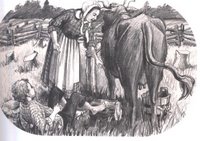
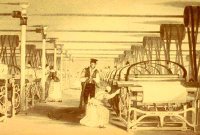 If you were born in the country, you might be able to stay there–always assuming you weren’t forced out by foreclosure–or you might seek a job in a mill or factory in one of the rapidly growing industrial cities.
If you were born in the country, you might be able to stay there–always assuming you weren’t forced out by foreclosure–or you might seek a job in a mill or factory in one of the rapidly growing industrial cities.
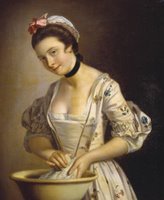
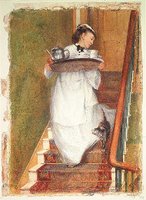 Or, you might go into service. Here’s another amazing statistic: in the eighteenth century, one-third of all the population (with the exception of the aristocracy) was in service at some time in their lives—usually until their mid-twenties. About one-third of London’s population was servants. Some people, working in the houses of the rich, rose in the ranks to enter the servant elite as butler, housekeeper, or lady’s maid; even though this illustration is from the mid-eighteenth century, you can see how well-dressed this lady’s maid is. Servants earned room and board, plus “perks”—for a ladies maid or valet, cast-off clothing they could wear or sell—or “vails,” tips from visitors usually given to footmen.
Or, you might go into service. Here’s another amazing statistic: in the eighteenth century, one-third of all the population (with the exception of the aristocracy) was in service at some time in their lives—usually until their mid-twenties. About one-third of London’s population was servants. Some people, working in the houses of the rich, rose in the ranks to enter the servant elite as butler, housekeeper, or lady’s maid; even though this illustration is from the mid-eighteenth century, you can see how well-dressed this lady’s maid is. Servants earned room and board, plus “perks”—for a ladies maid or valet, cast-off clothing they could wear or sell—or “vails,” tips from visitors usually given to footmen. 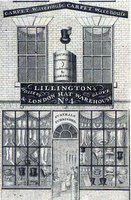 The maidservant illustration is from the mid-nineteenth century, but gives you an idea of what it was like being at the beck and call of a bell, and negotiating stairs in a long skirt, possibly carrying something worse than a tea service. Becoming a servant for a few years gave you upward mobility; hopefully you’d have saved enough to leave, marry, and own your own business—a shop, maybe—and have a servant or two of your own.
The maidservant illustration is from the mid-nineteenth century, but gives you an idea of what it was like being at the beck and call of a bell, and negotiating stairs in a long skirt, possibly carrying something worse than a tea service. Becoming a servant for a few years gave you upward mobility; hopefully you’d have saved enough to leave, marry, and own your own business—a shop, maybe—and have a servant or two of your own.
But life was uncertain and who knows where you might end up (another interesting statistic, although one I find difficult to believe: one third of the female population of London during the nineteenth century were prostitutes). You might find yourself reviewed in Harris’s List of Covent Garden Ladies, a sort of Michelin Guide to whores for the discerning gentleman.
Your best bet, really, as we told the woman smart enough to ask this interesting question, was to marry as well as you could.
So what what would you be?
If you want to be a contest winner, visit my website, sign up on my mailing list to enter my contest, and read various excerpts including one from JANE AUSTEN: BLOOD PERSUASION.
